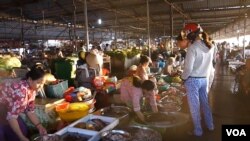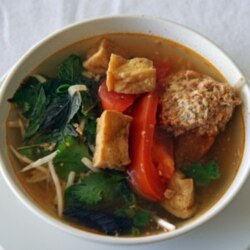Vietnam is being hit by a pork shortage, brought on by the scourge of swine fever and the U.S.-Chinese trade war, just before Tet, the Lunar New Year — a holiday in which pork plays a key role — approaches.
The swine fever virus has been spreading through Asia and devastating pig populations in a number of countries. It is estimated that one-fourth of the global supply of pigs has died this year. Meanwhile, the trade war has made imported U.S. pork more expensive in China, which has turned to Vietnam and other sources, cutting into the supply in Vietnam.
Vietnamese are concerned that the country could be short of $1.3 billion worth of pork by next month, just before Tet, the Vietnamese New Year.
Moreover the shortage comes as rising incomes mean pork has become a staple for more people across the nation who once could afford only a vegetarian diet. Pork is stuffed into bitter melon, caramelized in a clay pot, placed over egg noodles or otherwise added to innumerable other local recipes.
The issue has come up at multiple meetings of government officials, who are making it a priority to ensure supplies and keep prices affordable.
“We had six conferences to direct, distribute, and guide pig herds, spreading the model to farms, farm businesses, and provinces to apply biosecurity measures and use of inoculants to increase resistance, thus limiting African swine flu,” Phung Duc Tien, deputy minister of agriculture and rural development, told reporters last month.
The government said this month that the number of pigs it had to cull was down 88% from May.
“Many localities have also effectively issued directives to supply pork to the market,” Tien said.
In China it is joked that the measure of inflation, CPI, is actually the “consumer pork index,” instead of consumer price index. A similar observation could be made in neighboring Vietnam, where pork is such a staple that locals frequently just use the generic term for meat, “thit,” when they are talking about it.
Pork is taking on more importance now as the Lunar New Year soon approaches. For some people Tet is not Tet without the traditional foods, such as banh tet or banh chung, which is a snack of rice filled with ground pork and wrapped in banana leaves, as well as a common gift that families take pains to make themselves during the holiday.
To prevent a shortage, Vietnam is turning to foreign supplies. Many of them, however, are the less-preferable frozen pork. Many Vietnamese are used to purchasing chickens, frogs, or fish that are still alive at an open market to cook. Frozen meat is not quite the same.
This is not the first time pork has been an issue here. In the past two months Australia has cited swine flu as the reason it deported two Vietnamese nationals for carrying pork into the country. Swine flu is also political next door in China — the government excluded UBS Group AG from a bond deal after one of its senior economists made comments about the flu.













